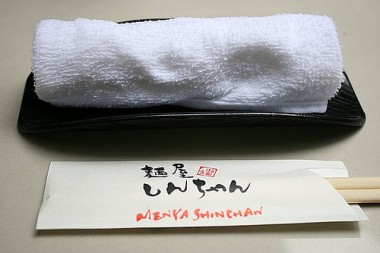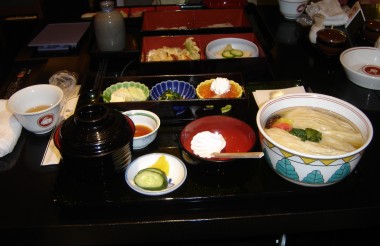“Irashaimase!” That’s the “Welcome!” you hear bellowed when you enter a restaurant in Japan. Here are a bunch of other words and customs plus some dos and don’ts to know when eating in Japan.
Entering a Restaurant in Japan
First of all, the welcome you hear often sounds more like: “Iiiiiirasshaimaseeee!”
Or some people, especially guys, will say just, “Irashai!” in a very emphatic almost grunting way! Girls sometimes say, with a smile and tilt of the head, a very sweet, “Irashaimase!”
But “irashai” is only used to mean “welcome” when you enter a shop. And there’s a word they only use in Osaka or sometimes Kyoto: “Okini!” Just another way to say, “Welcome to our shop!”
Anyway, Japanese can be a very expressive language. Yes, it can be very monotone and matter-of-fact, maybe especially with the business crowd. But I found it exciting the range of expression I usually heard and learned to partake in!
After the initial welcome right when you enter, at some restaurants a waiter will approach you and say, “Nan mei sama, desuka?” This means, “How many people, sir/madam?” (“Sama” is a very respectful way to refer to a man or woman.)
Some people may say, “Nan nin sama desuka?” The phrase “Nan mei sama desuka?” is actually mainly just used at hotels and restaurants to sound really polite.
You respond by saying: “hitori” (one person alone), “futari” (two people), sannin (three people), yonin, rokunin, shichinin, hachinin, kyunin, or junin (ten people). Or you can just hold up your fingers to indicate the number! Then the waitress will seat you.
If it’s a fast food place like Yoshinoya, or a traditional Japanese bar with food, “izakaya“, people behind the counter will just point to an empty chair and say, “Dozo!”
“Dozo” is one of the Japanese words for “please”, as in, “Please, go ahead… take a seat, have one of these, ask a question, etc.”

"Oshibori", warm hand towel, and disposable chopsticks: only wash your hands and don't rub those chopsticks together!
Dos and Don’ts at Japanese Resaurants
Things that are impolite in Japan:
- Often you’ll be given a warm, moist hand towel called an “oshibori” at the start of the meal. Use this wash your hands only. It may be tempting to wash your face and neck too but it’s considered rude. The only people who do it in Japan are oyaji, old guys!
- Sometimes restaurants will give you disposable chopsticks. Some people will take these chop sticks and rub their chopsticks together to get rid of the splinters. But in Japan this is considered rude. If there are splinters just gently pick them off with your fingers.
- The Japanese and many other nationalities find it rude to blow your nose. You can wipe your nose but don’t blow it and make noise.
Things that are okay to do in Japan but might be impolite in the West:
- Japanese foods feature a lot of soups, broths, and ramen noodles: you can slurp all of these! It’s okay to loudly slurp your noodles as you eat them with your chopsticks. It actually helps to cool them down and it’s perfectly normal in Japan.
- You can also lift your bowl of soup or broth to your face and drink directly from the bowl. If the bowl seems too big you can put your face down to it and drink from it that way.
- In Japan, sometimes people order their own personal dishes and sometimes people share serving dishes, especially at izakaya bars. When you share a serving dish it’s okay to eat directly from the serving dish with your chopsticks. This would be considered unsanitary in the North America or Europe but in Japan it’s usually fine.
- Another thing that used to be considered okay in Japan is burping. But things have changed and this is much less accepted now.

The Japanese often present their food in a really lovely way in both restaurants and homes. This is a beautiful bento box lunch I had. Oh and if you have something like this: you can go ahead slurp from that soup on the right!
Giving thanks for the Food
I’ll probably write another post just with words, vocabulary, terms, and phrases to know and use when eating in Japan. But for now I’ll mention just two words: “itadakimasu” and “gochisosama deshita“.
“Itadakimasu” is said at the beginning of every meal and “gochisosama deshita” is said at the end.
Both of them are about giving thanks for the meal and are really directed at the one who made the food.
Itadakimasu is kind of like “bon appetite”. But it’s something you say yourself, to your food and the ones who made it: to show thanks. Bon appetite you usually say to someone else hoping they have a good meal.
So often that’s how you say thanks and good-bye at Japanese restaurant: “Gochisosama deshita!” It literally means, “That was a real feast!”
The cook and waiters will certainly respond by saying, “Arigatou gozaimasu!” or “Arigatou gozaimashita!” And may say, “Mata okoshi kudasai!” “Please come again!”
Background
I lived in Osaka, Japan for eight months in 2004 teaching English. I’m drawing on those experiences and also help from my step-mom, Tomoko Shibuya, who is from Japan. A big thanks for her help with this post! But if there are any mistakes they are my own!
Tomoko will also be helping me on my Worldschool Travel Tour: Japan in Autumn 2009. The tour consists of six teen and young adult homeschoolers/unschoolers and we’ll be leaving in just three weeks!
I’ll be leading another tour to Japan next year especially for homeschooling and unschooling teens and young adults: Worldschool Travel Tour: Japan in Summer 2010.
I hope this info is helpful and inspiring to those who have thought about traveling to Japan or are just interested in foreign cultures!
Honestly, when I think of the tour I keep thinking about the food! I got tired of it after living there for eight months: but now I miss it and am excited about eating at Japanese restaurants again! I miss the food and the sounds actually!
An excellent guide. Did you find that it is considered impolite to eat less than all of your food there? I have occasionally read this in books or witnessed it in a local Japanese restaurant but you don’t mention experiencing it in your travels.
Hi Rachele,
Thanks for the comment and question! I’m kind of in the the habit of always finishing all I’m served so it never came up for me personally!
But I think you’re right: Japanese have a real concern for scarcity and not wasting, it seems. Part of it may have to do with being an island nation with limited resources.
Also, I think what you’re saying was probably the case even more so a generation or two ago: during WWII things were very scarce so food was precious and not to be wasted.
Come to think of it a Japanese friend did tell me that her parents or grandparents told her to never throw away any food: they said there are seven gods living in every grain of rice. (Referring to the Seven Gods of Good Fortune 七福神, Shichi Fukujin.)
And while things change, I think she herself still cared about it.
But like I say I like to always finish my food anyway! Also in Japan portion sizes are often small so you don’t have to worry about it too much in that way.
And something I wish I had mentioned in general: Japanese people are very welcoming and understanding of foreigners. They are much more concerned about offending you, than you offending them, it seemed to me.